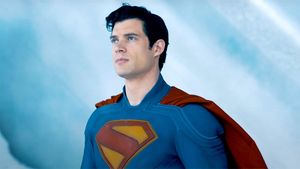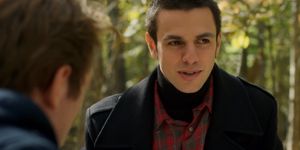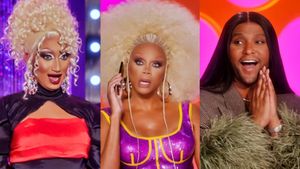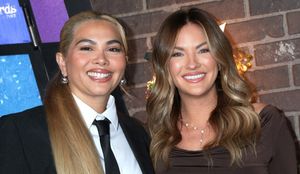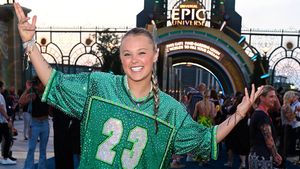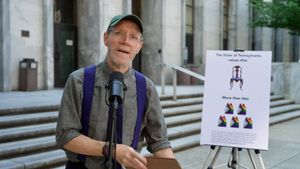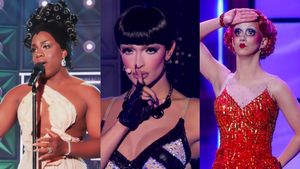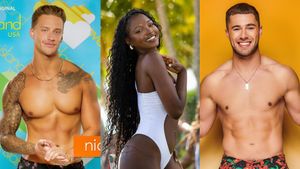Dustin Lance Black is used to dreaming big. When the then-unknown screenwriter decided to tackle a script about his hero, gay civil rights revolutionary Harvey Milk, he approached Craig Zadan and Neil Meron, the producers who had long held the rights to Randy Shilts's definitive Milk biography, The Mayor of Castro Street . By that time Zadan and Meron already had spent more than a decade trying to get a film about Milk off the ground, even recruiting heavyweights Oliver Stone, Gus Van Sant, and Robin Williams to their effort. When they turned down Black's offer to write a completely new script, he decided to go it alone.
With no financial backing, Black proceeded to do the legwork on researching Milk's life and write a script on spec. He befriended Milk's protege Cleve Jones and interviewed the slain San Francisco politician's other surviving friends and colleagues. "He didn't dismiss us as dinosaurs," Jones says. "That was a big part of getting everyone to open up. People shared stores with him that they had stopped talking about years ago."
Then, just as it seemed likely that Zadan and Meron's Milk movie was about to get the green light at Warner Bros., with The Office 's Steve Carell starring, Jones introduced Black to his friend Van Sant, who signed on to direct Black's screenplay and brought Sean Penn on board to star. The rest is gay -- and Oscar -- history.
Now Black has another dream. In the writer's vision of the not-distant future, gay men and lesbians will have "full and inclusive civil rights in all 50 states." With the idealism of a political neophyte and the blind drive of someone who's recently tasted dramatic success, he rejects the state-by-state strategy long employed by the marriage-equality movement and proposes to "take the fight federal" by pushing for a gay and lesbian civil rights act. "Martin Luther King didn't say we will have freedom in Georgia and then maybe we'll go to Connecticut," Black says. "It was always about the entire nation."
He's teamed up with Jones, activist Chad Griffin, and Milk producer Bruce Cohen to form an organization, now in its early stages, that hopes to harness the momentum of the film and the reaction to Proposition 8 to work toward marriage equality. "The only ways we've ever made advances are when we've named the dream," Black says, confidently using a metaphor first articulated by Milk: "Not the crumbs, not the little pieces around the edges. You have got to name the dream or you'll never get it."
Black did just that on February 22 when he stepped up to the podium of Hollywood's Kodak Theatre to accept the Oscar for best original screenplay. He used his moment in the spotlight -- in front of roughly 35 million U.S. viewers and untold numbers worldwide -- to convey his hero's sentiment: "If Harvey had not been taken from us 30 years ago, I think he'd want me to say to all of the gay and lesbian kids out there tonight who have been told that they are less than, by their churches, by the government, or by their families, that you are beautiful, wonderful creatures of value and that no matter what anyone tells you, God does love you."
As the camera panned to Penn tearing up and cheering, it was clear that the 35-year-old writer who had so eloquently given voice to our past is on a crusade to change our future.
Black gave a lot of consideration to what to say in that speech. "I thought if I was [still] 11 or 12 years old in San Antonio, Texas, what would I want to hear?" he says. "What people don't know is there's all these other events leading up to the Oscars -- Q&A's, speeches, talks," at which he honed his message.
The practice paid off. The blogosphere is filled with declarations of love for Black. Even Oprah Winfrey fawned over him on her show, bringing his exposure to a level few writers attain. One of those writers, Oscar-winner Diablo Cody ( Juno ), took Black aside during the awards season to coach him. "She saved my life. She was like, 'You're feeling this way now, and prepare to feel X, Y, and Z,'E,f;" he recalls, explaining that Cody's advice was about "making sure you don't disconnect from your work."
Partly because Black grew up Mormon and struggled to come out of the closet, his life story -- like Cody's -- is a magnet for media attention. But unlike the tattooed former stripper, Black has a message that hits at an emotional core. He's received beautiful letters thanking him for his speech. "Kids write, 'My mom spoke to me for the first time about being gay,'E,f;" he says. "I'm so humbled by that."
In West Hollywood, Black is like the patron saint of gay writers. After a Writers Guild gay filmmakers' panel in March, he was pounced on by a young woman bearing cupcakes. Her male companion excitedly blurted out that he and Black have a Facebook friend in common. Pressed on how it feels to be so sought after, Black is guarded. "There's no safe way to answer that question," he says. You get the sense that while he relishes the attention, Black has mixed feelings about where that attention is coming from. Take his nights out on the town. "People don't say, 'Oh, you were cute giving that Oscar speech,'E,f;" he complains. Black, who is single, seems to draw a lot of lesbian couples. "They are interested in marriage equality, and we start engaging in [political] conversation. It's great, but all of a sudden it's 1:30 a.m., you've had two more vodka-and-sodas, and you've spent your whole night talking to these cool lesbians about relationship rights," he says, sighing. "That's why I don't get laid."
Nonetheless, the payoffs are deeply meaningful. Black's mother, who is battling cancer ("She's going to be fine," he says), accompanied him to the Oscars. "It's been a huge journey for her. She was weeping with pride that I said I want to thank my mom for always loving me even when there was pressure not to." His mother, who uses crutches and braces to get around because of a childhood bout with polio, raised Black and his two brothers on her own in a conservative Mormon community in San Antonio.
"We were welfare kids," Black says. "My father vanished, literally just took off one day." His mother remarried twice; the second time, in Black's early teens, she brought the family to Northern California, where his stepfather was stationed in the Army. "Trust me, the coming-out process was not easy," he says. "My mom did not immediately go, 'I love you.'E,f;" Now she's 100% supportive. "All she's worried about is when am I going to get married and have a kid. She wants to be a grandma."
But not everyone has come around. "Mostly it's the judgment of silence [from my father]," who is Mormon. But after the Oscars, he says, "I got one letter from a cousin or something [of my father's] expressing the great shame I've brought to our family." Black's voice softens to a whisper as he swallows his emotions. "I was disappointed by that."
Black has sought new fathers. He's cultivated strong relationships with older gay men who have been mentors in his career. TV director and producer Paris Barclay ( In Treatment ) read a script of Black's in the late 1990s and took the University of California, Los Angeles, grad under his wing. "Paris was one of the first people to encourage me to write," Black says. "He would even throw me some cash to finish a script." Together they sold a screenplay about the life of HIV-positive Real World star Pedro Zamora. The finished product aired this spring on MTV, but neither he nor Barclay had anything further to do with the production.
Marc V. Olsen and Will Scheffer, the professional and romantic partners behind HBO's Mormon drama Big Love, have also been mentors. "They walked me through the ins and outs of the TV world," says Black, who was a writer on the series, for which he drew on his childhood experiences. "They were very much like parents to me."
Then, of course, there's Van Sant. The To Die For director had "done a number of attempts" at a script about Milk himself, so he knew the challenges of writing it. And when Jones brought Van Sant and Black together, the director was impressed with the writer's research. "He was way more up on the issues and the people and politics of San Francisco than I was," says Van Sant, who brought Black with him to meetings to make sure he had his facts straight and to show the writer the ropes.
"I felt a very easy partnership between the three of us," says Penn, whose experience with Black on Milk left a significant impression. "I think he's going to be a force, frankly, and I think he's going to be a really valuable force."
Van Sant thinks so as well. He has Black writing a script based on The Electric Kool-Aid Acid Test , Tom Wolfe's 1968 account of Ken Kesey and the Merry Pranksters' acid-fueled road trip. Black has spent much of the last six months interviewing surviving Pranksters like Gretchen Fetchin the Slime Queen. Van Sant picked Black for the project partly because of On the Bus , the 2001 documentary Black directed about the bacchanalian experience of Burning Man. Van Sant calls the annual gathering in the Nevada desert "the closest thing that exists to San Francisco in the early '60s."
Aside from On the Bus and My Life With Count Dracula (a documentary he directed in 2003 about a man who brought vampire movies to TV), Black wishes his past projects would stay in the past. "We all have to learn from our mistakes," he says. "It's just some of our mistakes end up on DVD."
Among those "mistakes" are two movies Black made for money. "I thought, No one will ever see them ." Sure enough, he was in a local video store recently and spied a sign: "If you like Milk, you'll love Blank " -- he won't say the title. "I was like, 'Can I take that down?'E,f;"
The movie in question, which Black "rewrote in one day while answering phone calls at this day care center through a temp agency," is 2000's The Journey of Jared Price , a gay coming-of-age tale that he promoted proudly at the time. "It was a script that read like soft-core porn," he says. "I took out all the sex and we shot it in four days for like 15 grand." He leans in closer to the recorder: "So listen, kids, don't ever commit anything to film that you don't want seen."
It's a lesson Black has learned well. About Gay Hollywood , the 2003 AMC reality series he appeared on, he says dismissively, "I don't even know what that was. It was all white, blond-haired, blue-eyed Christian gay guys in their 20s." He says he was galled by the show's lack of diversity. "I was like, I know better than this. Why did I get myself into this? "
Luckily, Black's future is filled with promising projects, including a movie about Washington politics and a TV series, neither of which he's ready to discuss. He's also preparing to direct the film What's Wrong With Virginia , which he wrote five years ago. "It's a very personal story," he says. Loosely based on his childhood, it's a drama about a boy who is caretaker to his impoverished, schizophrenic mother. (In reality, someone else in Black's family is a functioning schizophrenic.) Jennifer Connelly and Liam Neeson are attached to star.
On a cold day in early April, Black was in Washington, D.C., taking a private tour of the U.S. Capitol. Just as he and his guide had ascended the winding staircase to the top of the dome, where -- just beneath the bronze statue called Freedom -- they were poised to take in the 360-degree view of the nation's capital city, Black's phone started buzzing with a flurry of text messages. Days after the Iowa supreme court had ruled in favor of marriage equality, the Vermont legislature overrode a veto by its governor and legalized same-sex marriage. "It was one of the more poetic things ever for me," says Black, who had spent the previous night on the phone trying to lobby state lawmakers. "We were like five votes short," he says excitedly. "I got answering machines."
Black is elated by the accomplishment. "I think anyone interested in civil rights must be thrilled," he says. "I was tickled pink." But while some might see the victory in two states as a shot in the arm for the one-state-at-a-time approach, Black stands firm in his conviction that the movement must "abandon the strategy of gradualism" and "take the fight federal," he says. "I believe now is the time."
He has yet to articulate a detailed plan for a nationwide campaign, but in late March he spoke at Outgiving, an annual gathering of gay philanthropists in Las Vegas, and his call for federal civil rights legislation seems to have surprised some leaders who have invested years -- decades, even -- in a historically proven strategy of state-by-state progress. "I'm sure they just wanted me to sound inspirational, do a five-minute version of the Academy Awards speech," Black says.
"The federal plan that Martin Luther King helped bring aboutaEUR|came after decades of what some might disparage as 'state-by-state' work," says Evan Wolfson, executive director of Freedom to Marry. "The federal government doesn't issue marriage licenses, states do." But Wolfson understands that Black is the one currently holding the microphone. "Lance Black has a really important voice and a great opportunity to help move people to action."
He and other activists would be wise to try to utilize that voice. Black's writerly idealism and youthful impatience along with their experience could be the perfect combination -- on the state and national level. Because, as his "coconspirator" Jones explains, Black may have had his 15 minutes in the spotlight, but he's not going to stop rattling the cages any time soon. "Lance looks young and he has a cute face," Jones says, "but no one should underestimate this young man. Believe me."


